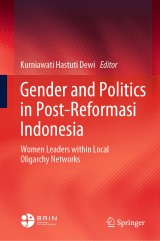Details

Gender and Politics in Post-Reformasi Indonesia
Women Leaders within Local Oligarchy Networks|
117,69 € |
|
| Verlag: | Springer |
| Format: | |
| Veröffentl.: | 02.07.2022 |
| ISBN/EAN: | 9789811917349 |
| Sprache: | englisch |
Dieses eBook enthält ein Wasserzeichen.
Beschreibungen
<p>This book employs a gendered perspective to uncover an in-depth understanding of the political role of women leaders in local government in Indonesia. Beginning with the story of two women who successfully won the local elections in Indramayu in 2010 and Tangerang Selatan in 2011, respectively, the book uses their experiences as a point of departure to present a discussion on female political leaders’ part within the larger political dynastic structure in Indonesia. The book explores the multiple challenges and difficulties that these women encountered in reaching power and in promoting local democracy, highlighting the patriarchal nature of the oligarchy. In doing so, this book provides a rich empirical account of the current features of female political leaders and their political and familial, linkages. The research, thus, contributes significantly to the work of scholars and political activists seeking to unpack the process and progress of democratization in post-reformasi Indonesia, in which women’s political participation and leadership are an inevitable and vital part. In doing so, the book champions how Indonesian women are playing an increasingly important role in the democratic process, even in the face of the enduring challenges posed by familial ties and political dynasty factors that continue to hinder democratization—trends that are also prevalent across multiple Southeast Asian countries in the twenty-first century. Relevant to scholars and students situated at the intersection of gender and politics, this translated and updated co-publication is a tour de force, led by one of Indonesia’s seminal scholars in women’s studies.<br></p><br><p></p>
Chapter 1. The Emergence of Women Local Leaders in Indonesia’s Reformation Era and The Presence of Familial Ties Factor.- Chapter 2. Airin Rachmi Diany’s Position within Local Oligarchy Network in South Tangerang.- Chapter 3. Airin Rachmi Diany's Performance in Promoting Local Democratization and Practical Gender Interests in South Tangerang.- Chapter 4. The Position of Woman Local Leader within Oligarchy Network: Anna Sophanah in Indramayu.- Chapter 5. Anna Sophanah’s Performance in Promoting Local Democratization and Practical Gender Interests in Indramayu.- Chapter 6. The Position and Performance of Women Local Leaders within Local Oligarchy Networks: Case of South Tangerang and Indramayu.- Chapter 7. Women Local Leaders within Local Oligarchy Networks in Post-<i>Reformasi</i> Indonesia: Existing Conditions and Challenges.
<p><b>Kurniawati Hastuti Dewi</b> is senior researcher at Research Center for Politics, National Research and Innovation Agency (BRIN) (formerly known as Indonesian Institute of Sciences, LIPI) since December 2000. Her research interests are in gender and politics, women and politics, gender and Islam, local politics, and civil society. She is the founder and coordinator of the Gender and Politics research team at BRIN since 2015. She has been actively building networks with international feminists and scholars and was elected as Secretary-General of the Asian Association of Women's Studies (AAWS) 2020–2022. She has a bachelor’s degree in politics with <i>Cumlaude </i>from Faculty of Social and Political Sciences, Diponegoro University in 2000, and has an M.A. (with first class honors) from the Faculty of Asian Studies at the Australian National University (2007). She obtained her Ph.D. in Area Studies from Graduate School of Asian and African Area Studies (ASAFAS) Kyoto University (2012). Some of her scholarly works can be found in prominent journal such as <i>Southeast Asian Studies, Asian Journal of Women's Studies, Asian Studies Review, SOJOURN: Journal of Social Issues in Southeast Asia, </i><i>Asian Women, </i><i>Indonesian Feminist </i><i>Journal</i>. Some of her key publications are: <i>Indonesian Women and Local Politics: Islam, Gender and Networks in Post-SuAharto Indonesia</i> (Singapore: National University of Singapore Press and Kyoto University Press, 2015); “Motherhood Identity in the 2019 Indonesian Presidential Elections: Populism and Political Division in the National Women’s Movement”, <i>Contemporary Southeast Asia </i>vol. 42, no. 2 (August 2020): 224–50. <br></p><br>
<p>This book employs a gendered perspective to uncover an in-depth understanding of the political role of women leaders in local government in Indonesia. Beginning with the story of two women who successfully won the local elections in Indramayu in 2010 and Tangerang Selatan in 2011, respectively, the book uses their experiences as a point of departure to present a discussion on female political leaders’ part within the larger political dynastic structure in Indonesia. The book explores the multiple challenges and difficulties that these women encountered in reaching power and in promoting local democracy, highlighting the patriarchal nature of the oligarchy. In doing so, this book provides a rich empirical account of the current features of female political leaders and their political and familial, linkages. The research, thus, contributes significantly to the work of scholars and political activists seeking to unpack the process and progress of democratization in post-reformasi Indonesia, in which women’s political participation and leadership are an inevitable and vital part. In doing so, the book champions how Indonesian women are playing an increasingly important role in the democratic process, even in the face of the enduring challenges posed by familial ties and political dynasty factors that continue to hinder democratization—trends that are also prevalent across multiple Southeast Asian countries in the twenty-first century. Relevant to scholars and students situated at the intersection of gender and politics, this translated and updated co-publication is a tour de force, led by one of Indonesia’s seminal scholars in women’s studies.<br></p>
Offers a novel gendered perspective in understanding local patriarchal dynamics in politic structures in Indonesia Goes beyond the traditional institutional approach to highlight the contribution of Indonesian women in democratization Highlights the challenges posed by the political dynasty and affiliated nepotism within the democratic process
<p><br></p>
Diese Produkte könnten Sie auch interessieren:

Enabling Social Europe

von: Katharina Mader, B. Maydell v., K. Borchardt, K.-D. Henke, R. Leitner, R. Muffels, M. Quante, P.-L. Rauhala, G. Verschraegen, M. Zukowski

53,49 €















